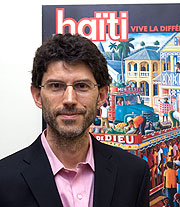  |
| HOME | THIS ISSUE | CALENDAR | GRANTS | BACK ISSUES | < BACK | NEXT > |
Anthropologist’s book analyzes impact of globalization on sugar cane workersby Karen Singer - December 3, 2007 | ||||
| They live in primitive barracks and earn a pittance, toiling for hours in the blistering heat as sugar cane cutters in the Dominican Republic. Yet despite their circumstances, says Samuel Martínez, these Haitian migrant workers are as eager as residents in more affluent societies to acquire consumer goods and pursue gratification beyond their basic needs. Such desires, he contends, “are being promoted by global media, and also play into a deep-seated human fascination – perhaps even a need – to transcend the limits of the mundane, to dream beyond reality.” Martínez, an associate professor of anthropology, studies Haitian migrants living in the Dominican Republic. He began the research for his doctoral dissertation, looking at migrant workers living in a company compound called Monte Coca. At the low end of the social ladder, they are targeted for abuse, and fare far worse than the Haitian nationals who live there year-round, amid the permanent Dominican residents. During the past two decades, he has expanded its scope to include other groups making up the compound’s social hierarchy. He recently published a book on the subject, Decency and Excess: Global Aspirations and Material Deprivation on a Caribbean Sugar Plantation (Paradigm Publishers, 2007). “Payday weekend bingeing, home decorations … and desires for consumer durables such as television sets and refrigerators are not expenditures that we in the more prosperous countries of the world readily associate with people living in dire poverty,” says Martínez, “and yet you see all these things and more in Monte Coca and other company compounds and impoverished neighborhoods in the Dominican Republic and elsewhere in the so-called Third World.” Their aspirations are reflected, to some extent, in photographs Martínez took of the people he studied. In exchange for being allowed to take candid photos of their daily lives, he also took “beauty shots” staged by the interviewees, which he gave to them. The two types of photo often show a very different picture. In one instance, Martínez recalls, so many possessions were crammed into the room, including a TV set and glass-fronted display cabinet with china figurines, that they almost seemed to be crowding the owner to the edge of the picture. During repeated visits to Monte Coca, Martínez has observed that people’s expectations of what constitutes a good life have grown, while at the same time there’s been a constriction of what their declining incomes can buy them, as well as an increased level of economic inequality among the mass of working people. Although free market reform and divestment from sugar production have provided more economic opportunities, other work doesn’t pay much better.
“With increases in already shocking levels of poverty has come a coarsening of the social fabric,” says Martínez, “with people turning their backs on the proletarian ethic of living as equals and in solidarity vis-à-vis capital, to engage in some pretty terrible ways of exploiting each other, the stronger taking advantage of the more vulnerable, as well as reaching for commodified dreams of a better life, as advertised through electronic communications media.” Martínez says his research adds to growing anthropological literature on cultural globalization by looking beyond the motivations social researchers usually ascribe to expenditures beyond utility, and noting evidence that these consumer aspirations respond also to people’s needs to transcend the limits of the mundane. “What I’m bringing to this debate is an appeal to consider not only custom and thought, but also relations between people and the texture of everyday life as domains on which globalization may have an impact,” he says. “Even though local culture may retain much of its distinctiveness, as reflected in annual rituals like Rara (a voodoo-inspired, carnival-like Lenten festival featuring band processions, lavish costumes, competitive dancing, and participants in a trance and other heightened states of emotion), economic decline – paired with proliferating consumer aspirations – divides communities into haves and have-nots, with worsening levels of exploitation and violence.” Martínez last visited the area in spring 2007 for Rara, a Haitian tradition, and was surprised to notice the Dominican flag prominently carried in the parades. “I can’t help but see that as a reflection of a larger trend that has taken shape,” he says, “for people of Haitian ancestry to proclaim that they belong to the Dominican nation, even though the festival is Haitian.” That emerging “Haitian-Dominican” identity has been the main focus of Martínez’sresearch since 2002. He has been studying Haitian-Dominican rights organizations, which work at the local level to help people identify and solve their problems. In his next book, to be titled “The Onion of Oppression,” Martínez will take his lead from these organizations’ “broad spectrum human rights agenda,” to examine the Haitian-Dominicans’ interlocking economic, social, cultural, and political/civil rights challenges. |
| ADVANCE HOME UCONN HOME |

